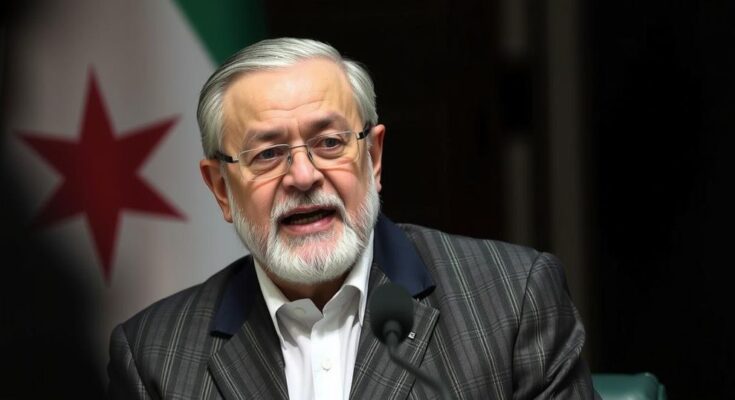Ahmed Al-Shara, the de facto leader of Syria, has publicly criticized Iran’s meddling in the country, asserting the need for Syrian independence from foreign influence. He emphasized the Syrian people’s autonomy and plans for cooperative relations globally, excluding Tehran if it continues its intervention. Al-Shara’s remarks come as tensions with Iranian-backed forces diminish and efforts to stabilize Syria increase, reflecting a demand for a peaceful and sovereign future.
Ahmed Al-Shara, currently the de facto leader of Syria following the ousting of Bashar al-Assad, has issued a candid critique of Iran’s persistent interference in Syrian affairs. In an interview with Al-Arabiya, Al-Shara affirmed that the Syrian people have liberated their nation independently and expressed aspirations for cooperative relations with both regional and global entities, contingent upon Iran halting its interventionist policies. Previously associated with Hayat Tahrir al-Sham, Al-Shara emphasized the necessity for Syria’s autonomy, stating, “We did not enter Tehran or southern Lebanon; we entered our own cities and villages,” to underscore his dismissal of Iranian influence.
Additionally, he noted that Syrian authorities have dismantled Iranian-affiliated bases and offices, emphasizing the government’s responsibility to secure Syria’s sovereignty. Al-Shara challenged the assertions made by Iran’s Supreme Leader, Ali Khamenei, regarding the absence of Iranian proxy forces in Syria, characterizing Khamenei’s statements as attempts to destabilize the current transitional government. He criticized Iran’s long-standing involvement in Syria, which he described as “historical vengeance,” and unacceptable to the Syrian populace.
The transitional government of Syria is currently grappling with numerous challenges, including the stabilization of the country and managing intricacies with Kurdish forces. Al-Shara has proposed the integration of Kurdish factions into the Defense Ministry as part of efforts to foster security and promote development. Concurrently, the withdrawal of thousands of Iranian-backed entities like Hezbollah and other militia groups illustrates Tehran’s waning influence in preserving Assad’s regime.
In conclusion, Al-Shara’s statements reflect a broader shift toward rejecting Iranian intervention in favor of establishing a sovereign and peaceful future for Syria. The new government appears committed to rebuilding the nation and reinforcing regional alliances against the backdrop of a growing repudiation of foreign meddling, particularly from Iran.
The commentary by Ahmed Al-Shara comes at a pivotal time in Syria’s political landscape, following significant changes in leadership and the withdrawal of Iranian-backed forces. Over the past thirteen years, Iran has exerted substantial influence in Syria, primarily through proxy militias to support the Assad regime. However, this prolonged involvement has led to increasing unrest and discontent among the Syrian population, resulting in a call for independence from foreign powers. Al-Shara’s leadership marks a shift toward asserting Syrian sovereignty and rejecting policies deemed harmful by the populace.
Ahmed Al-Shara’s critique of Iranian involvement in Syria highlights a significant shift in the country’s leadership dynamics and the pursuit of a sovereign future free from foreign interference. His vocal stance against Iran’s meddling reflects widespread frustration among Syrians and signals the transitional government’s commitment to develop constructive relationships with external powers. This evolution further manifests in the withdrawal of Iranian forces, indicating a decline in Tehran’s influence as Syria moves towards national reconstruction and stability.
Original Source: www.ncr-iran.org




